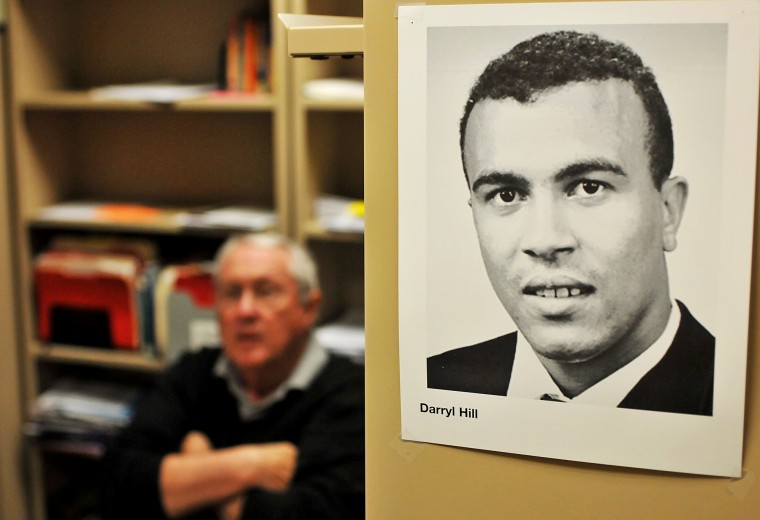
English professor Michael Olmert authored Moving the Chains
Darryl Hill has been called the Jackie Robinson of southern college football.
As a black man in the 1960s, he overcame the barriers of racism and segregation to play the sport he loved — all while wearing a Terrapin uniform.
His story is being brought back to life in a new play, Moving the Chains: The Darryl Hill Story, by Michael Olmert, an English professor at this university. The play’s first stage reading will be March 21 at the Lincoln Theatre in Washington.
“He didn’t want to be Jackie Robinson, he just wanted to be a player,” Olmert said. “He realizes now it had to happen because it wasn’t going to happen at Clemson or North Carolina or South Carolina. This had to happen at Maryland.”
The play chronicles the life of Hill, who became the first black man to play in the ACC in 1963, and the university that paved the way for integration when no other Southern institution would.
But Olmert said he had neither the time nor the interest when a friend, who had attended Hill’s high school, first approached him to write the story.
“I didn’t really want to write an athletic book because they’re not really dramatic; they’re usually just puff pieces, and they rarely make a good book,” Olmert said. “It would take a year out of my life.”
Yet on a snowy day last January, Olmert told Hill over lunch at Mulligan’s Grill and Pub at the University Golf Course that he didn’t want to make the story into a book. He was going to write a play instead.
Mulligan’s became the pair’s regular meeting spot. Every two weeks, for three hours at a time, Olmert took diligent notes as Hill recounted his life story — his childhood, his family, his friends, his time at the U.S. Naval Academy before transferring to this university and his time as a Terrapin running back.
But Olmert, who has written two plays and about 90 television screenplays, said the task was daunting at first.
“This scared me because I had never written about anyone who was alive before,” Olmert said. “You’re messing with their lives.”
But during the 45 days it took to write the script, Olmert said Hill “didn’t change a single word” at their weekly Mulligan’s meetings.
Olmert said he wrote the final scene of the play the night before it was scheduled to have a rehearsed table reading in Tawes Hall in May.
About 200 people crowded to watch the play’s debut, and at the end, Hill himself conducted a post-reading discussion.
Olmert said many attendees, especially black students, were shocked by the bigotry Hill faced not only at Southern stadiums but even on Route 1. For example, one night Hill tried to go drinking with his friends at Town Hall Liquors — then called the Town Hall Bar — but was denied entrance because of his race.
While Hill was a hero in overcoming racial barriers in intercollegiate sports, Olmert said he paid a heavy price.
“He had a restricted undergraduate experience,” Olmert said. “He could never really be himself. He was always under the microscope. He wasn’t just an ordinary Maryland student, and he wasn’t just an ordinary Maryland player. He was a black student. He was a black player. And if he did anything wrong, he might let down his race. … If you’re always having to be at your best, you’re not always at your best.”
After Hill was the first black man to play at South Carolina in 1963 in only his second game with the Terps, Hill told The Diamondback that he felt all eyes were watching his performance closely.
“You could sort of feel it in the air that many of them were looking for me to make a mistake or give a poor performance, but actually there weren’t any incidents to speak of,” Hill told The Diamondback on Oct. 1, 1963. “I guess many people probably felt that the South Carolina players would give me a good going over, but surprisingly they didn’t. Sure, they hit me hard, but they hit me clean too.”
Hill was the Terps’ leading pass receiver in that game as well as his debut game against NC State.
Senior English major Kevin Ford, who had played several roles at the reading in May, said Hill’s story has made him more proud to be a student at this university.
“To know that we broke the color barrier in the ACC — that’s a huge deal. And a lot of students don’t know about it, and a lot of Marylanders don’t know about it,” Ford said. “But what professor Olmert has done is to write a great play that is going to be seen by a lot of people to learn about this really amazing bit of Maryland history. And the fact that I can be part of that — even for a little bit — is really special.”
And Olmert said Hill’s story has all the ingredients to create a captivating production.
“The definition for drama is that there are two opposite things on stage and you let them bang it out against each other for two hours and see who wins. And you fall in love with one character and you root for that character,” Olmert said. “Darryl Hill’s story is that kind of story. You will root for him, and you will fall in love with him for the things that he overcame.”
villanueva at umdbk dot com



